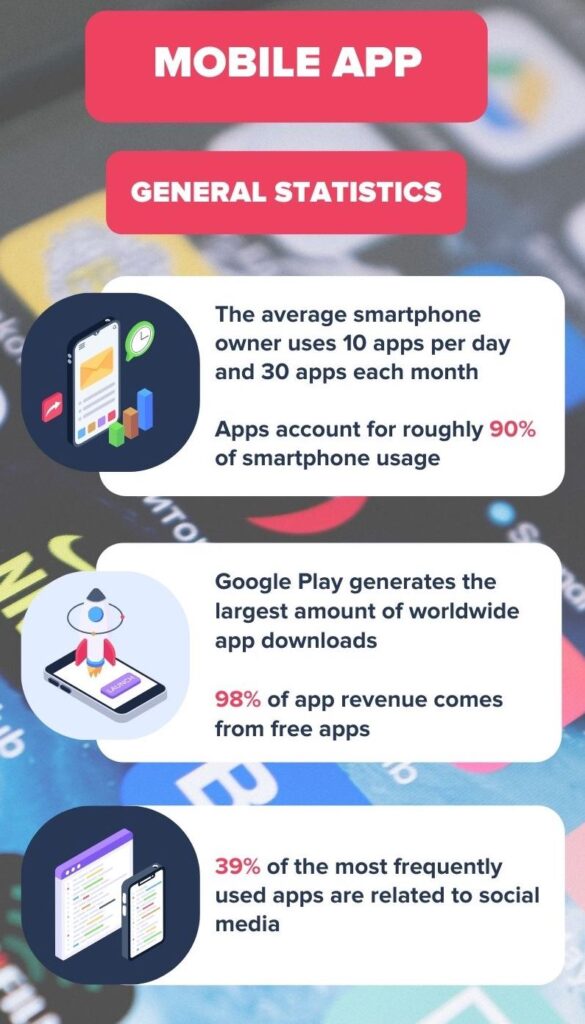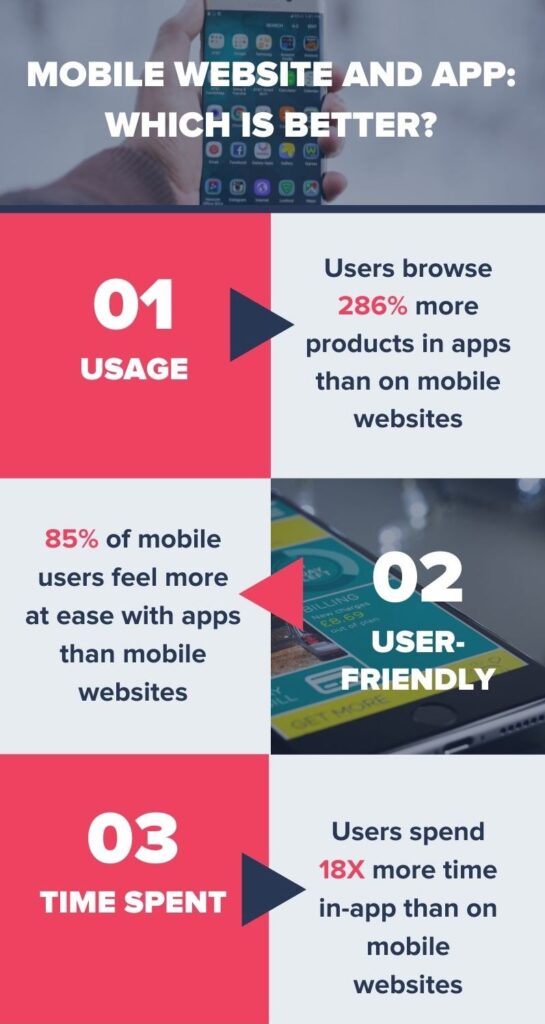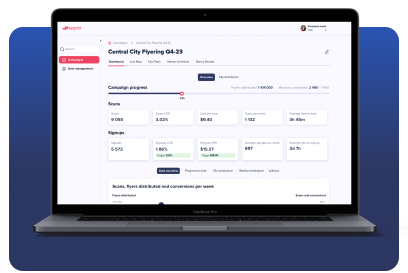As the internet and technology become more prevalent in our everyday lives, using it to promote a business or educate an audience is a great way to be successful. Mobile websites and mobile apps both have their advantages and disadvantages, but which one is better?
Users tend to prefer mobile apps over websites because they are customizable, they can be used offline, and they are able to send the user push notifications. Mobile apps are more “smartphone friendly” than websites and generally provide a smoother and faster experience.
Ultimately, whether a mobile website or app is better will depend on your goals, budget, and target audience.
Advantages of a Mobile Website
A mobile website refers to a mobile browser-based World Wide Web service. It is often described as a condensed version of a full desktop site. On a mobile website, content and features are streamlined so mobile visitors can get information as quickly as possible. Images and videos are condensed so they can fit a phone screen. A mobile website usually appears completely different from the company’s desktop website. The browser you are on will automatically direct you to the website depending on what device you are using.
Mobile websites have multiple advantages. A big advantage of a mobile website is its compatibility. Mobile websites are created with multi-device support. These websites are available to almost anyone on any platform. No matter what type of device you are on, a mobile website can adapt and still provide you with the information you are looking for. Users who own different brands/types of devices will especially appreciate this feature.

Mobile websites are faster to develop and market than mobile apps. Because mobile websites are displayed on the internet and not through app stores, they can be created and posted fairly quickly. Before apps can be launched they need to wait for approval from respective app stores.
Because of their compatibility, mobile websites can reach a very wide audience. A mobile website’s audience is not limited to the type of device the audience is using. This is very helpful when promoting a business and trying to expand your reach. The compatibility of mobile websites also makes them more shareable. A link for a mobile website can be shared across platforms.

An app does not have the sharing ability that a mobile website does. These website links can be emailed or texted as well as shared across social media platforms such as Instagram and Facebook.
Mobile websites are also known for easier support and maintenance. Websites cost less to upgrade, so you only need to maintain a single version of them. On a mobile app, you have to download every single update. This can become costly, and difficult to keep up with. Mobile websites allow you to change the content or design of the website by editing them once. After implementing this edit, the update becomes active across all types of devices. This saves both time and money.

Disadvantages of Websites
Although mobile websites are meant to be viewed on a variety of devices, a mobile website can’t leverage all smartphone features as effectively as an app can. Cameras, GPS features, phone dialing, and other features that are integrated into smartphones can’t always be used by websites, even when accessed on a smartphone.
Mobile websites do not have offline access. Even if you design your mobile website in the lightest and most informative way possible, it may work offline with limited functions. A mobile website relies on a good internet connection to operate correctly. A poor internet connection will result in the web page not loading or loading slowly. This can be inconvenient when you are trying to load websites such as banking sites where you are required to make a transaction quickly.

Websites are unavailable in app stores. Because they can’t be found in app stores, users might not even know about their existence. App marketplaces are a great way to get your content more exposure and expand your audience. With an app present in the app store, it is possible to advertise the app, compare it with other apps, put the app into a category, and even receive app rankings when comparing it to other apps with similar functionality.
Although a mobile website adjusts to the screen size of the device you are viewing it on, many mobile websites still have difficulty displaying all of their information on smaller screens, and their design can be distorted quickly. Words will be condensed aesthetically, or some information will be completely left out. It is difficult to design a mobile website that always functions in a responsive way, such that the user does not need to pinch, rotate or zoom in for the website to function optimally.

Advantages of a Mobile App
A mobile app is a computer program or software application that is designed to run on a mobile device such as a phone, tablet, or smartwatch. Apps are generally downloaded from app stores such as the App Store (IOS) or Google Play store. They can function without the internet or use a small amount of data from the web. Mobile apps are often created to be viewed on small screens and are highly interactive.

Mobile apps tend to have more options for customization and personalization. Applications are made to be adjusted to the users’ preferences. Mobile apps allow you to customize the interface of the app and its segments. You can even personalize the types of notifications that you get from apps that are downloaded.
One of the biggest advantages of using a mobile app is its ability to be used offline. Most mobile apps do not rely heavily on a good internet connection to perform well because it is downloaded directly onto your device. Many apps also have options to download certain features and data. This is especially helpful if the app is interactive. When you don’t have to rely on a good internet connection, the app can be used anywhere.
Additionally, mobile apps allow you to download important information, such as the AllTrails app’s functionality to download a trail route and use it without an internet connection while on the trail.
Mobile applications can also send push notifications to users. Notifications are a great way to keep your audience engaged and interested in your content. Notifications are one of the best ways to increase app engagement. Mobile apps allow you to send users personalized notifications that stem their interest. This is beneficial for both the user, as they can receive important reminders such as due payments or task reminders, as well as the app creator as they can increase user engagement with good notification practices.

Many mobile apps are interactive. Interactive apps allow users to interact with content via games, visualization, and more. Interaction can grab users’ attention and can be a great educational tool. Most apps have some level of interactivity. Highly interactive games also perform best on apps, much better than on mobile websites. Interactivity can increase the number of time users spend on the app. Interactivity can make your app more productive and appealing to users.
Mobile users also seem to enjoy mobile apps more than they enjoy mobile websites. Mobile users spend 88 percent of their time on mobile apps and just 12 percent of the time on mobile websites. Using an app is more appealing to users, for many of the reasons listed above. Visually and practically, apps seem to get a better response from technology users. As technology continues to have a big influence on people’s lives, it is important to consider the preference of mobile users and to be able to cater to their preferences.

Disadvantages of Apps
The biggest disadvantage of using a mobile app is the cost. This is mainly a disadvantage for the creator of the app and the business, but it can affect the user as well. App development is expensive and requires maintenance and support which also cost money. If you are prioritizing speed and quality, your app development phase will be more expensive. These increased costs can bleed through to the user in form of paid ads, or having to pay for an app to be published on an app store.
You may have to develop different versions of your app, which can increase costs further. Many app developers have to create different versions of apps for different app stores. Almost all apps needs to be created in different versions, for example and app for iOS devices and another version for Android device. Creating different versions can be extremely time-consuming and expensive. It can also be frustrating to users when apps are only available in certain app stores and not in others.

If an app is not cross-platform compatible, you are limiting your audience and limiting the exposure that might be necessary for your app to succeed. Cross-platform compatibility is crucial in todays world where Apple and Android users make up 99% of all mobile device users. If you don’t have a cross-platform app, you are severely limiting your growth potential.
Maintenance of your app is another cost factor that can be seen as a disadvantage. To be competitive and attract new users, apps constantly have to be updated. Apps need to be constantly monitored for bugs. Additionally, users have to continually download these updates or risk losing the usability and security of the app.

An app also has a larger risk of getting negative feedback. On apps, it is easier to leave negative reviews on apps stores or even report apps to the app store. Users may also get annoyed with the constant updates that they have to install.
To avoid these customer issues, you need to invest in good customer support. It is very important to provide users with good customer support so that the problems they are experiencing gets fixed. If an app offers no customer support and does not work to improve itself, users will simply delete the app, whereas they may revisit a website, even if it is not “up to standard.”

Which is Better For You?
Based on mobile user feedback, apps tend to be more popular. Users appreciate the opportunities for customization within an app as well as the interactivity that comes with apps. Apps are created specifically for smartphones so the content will always be easy to read on an app. This is not the case when viewing content on a website.
Mobile apps can result in more conversation and interest in your content. This is due to the interactive nature of apps and features such as notifications. Apps are a great choice if you are looking to develop content that needs to be viewed offline or on a mobile device.
The type of content that you are developing will also have an influence over whether an app or a mobile website is best for you. For example, banking companies have begun prioritizing apps. Banking apps are successful because they are interactive, quick, useful, and practical. They allow users to smoothly transfer money from their smartphones and check their account balances, which helps the app be successful.

If you are looking to create content that is purely going to be read by your audiences—such as journal entries, how-to-articles, or reviews—a mobile website is still a great option. Since few interactive features are necessary for this type of content, you can save money and time by launching a mobile website instead of an app.
Before choosing between an app or a website take a look at your goals for your content, the type of content you are currently developing, and your budget. After considering each of these things, you can make an informed decision that will guide you to your best option.
If you have a low budget, content that does not need to be interacted with, or content that does not provide usability or functionality, a mobile website could be the best choice.
On the other hand, if you have a higher budget, interactive content, and need to provide functional usability for your users, then a mobile app is likely the better option.







